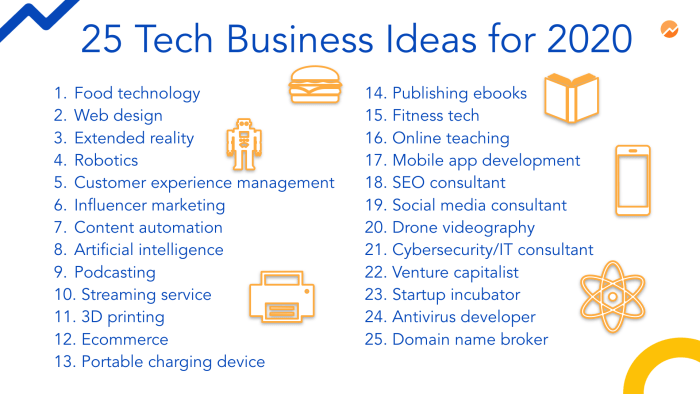Online Business Ideas are the gateway to entrepreneurial success in the digital world. From generating innovative concepts to effective marketing strategies, this guide covers all you need to know to thrive in the online business landscape.
Generating Ideas

Starting an online business requires a solid idea that can attract customers and generate revenue. Here are some ways to generate ideas for online businesses:
List and Describe Different Types of Online Businesses
- E-commerce: Selling products online through a website or platform like Amazon or Etsy.
- Subscription services: Offering products or services on a recurring basis, like meal kits or streaming services.
- Dropshipping: Selling products without holding inventory, by partnering with suppliers who handle shipping.
- Affiliate marketing: Promoting other companies’ products and earning a commission on sales.
Provide Examples of Successful Online Business Models
- Amazon: The largest e-commerce platform in the world, offering a wide range of products and services.
- Netflix: A subscription-based streaming service that produces original content and licenses popular TV shows and movies.
- Shopify: A platform that allows users to create their own online store and sell products without the need for technical expertise.
Discuss the Importance of Market Research in Generating Online Business Ideas
Market research is crucial for understanding customer needs, identifying competitors, and evaluating the potential demand for your products or services. By conducting thorough market research, you can make informed decisions and tailor your business idea to meet the needs of your target market.
Explain How to Identify Niche Markets for Online Businesses
To identify niche markets, consider focusing on specific demographics, interests, or problems that are not adequately addressed by existing businesses. Conduct research, analyze trends, and engage with potential customers to uncover niche opportunities that have less competition and high demand.
Monetization Strategies
In the world of online businesses, finding the right monetization strategy is crucial for success. Let’s explore the various ways to monetize an online business and compare different revenue streams.
Subscription-based Models vs One-time Sales
When it comes to monetizing an online business, subscription-based models and one-time sales are two popular options with their own set of pros and cons.
- Subscription-Based Models:
- Pros:
- Consistent Revenue: Subscriptions provide a steady stream of income.
- Customer Loyalty: Subscribers are more likely to stick around and make repeat purchases.
- Cons:
- Higher Churn Rate: Some customers may cancel their subscriptions, leading to revenue fluctuations.
- Initial Engagement: It can be challenging to convince customers to commit to a recurring payment.
- Pros:
- One-Time Sales:
- Pros:
- Immediate Revenue: You get a lump sum of money upfront.
- Lower Barrier to Entry: Customers may be more willing to make a one-time purchase.
- Cons:
- Less Predictable Revenue: Sales can fluctuate based on market conditions.
- Lack of Customer Retention: Without a subscription, customers may not return for future purchases.
- Pros:
Pricing Strategies for Online Products or Services
Determining the right pricing strategy for your online products or services is essential for maximizing revenue and attracting customers. Here are some key factors to consider:
Consider the value you are providing to customers and how much they are willing to pay for it.
- Competitive Pricing: Research your competitors’ pricing and adjust your prices accordingly to stay competitive.
- Value-Based Pricing: Set prices based on the perceived value of your products or services to customers.
- Freemium Model: Offer a basic version of your product for free and charge for premium features or upgrades.
- Bundling: Package multiple products or services together at a discounted price to encourage upsells.
Marketing and Promotion
In today’s digital age, marketing and promotion are crucial components of running a successful online business. Utilizing effective strategies can help increase visibility, attract customers, and ultimately drive sales.
Effective Digital Marketing Techniques
- Utilize email marketing campaigns to reach out to potential customers and keep them engaged with your brand.
- Invest in pay-per-click (PPC) advertising to target specific demographics and drive traffic to your website.
- Create compelling content such as blog posts, videos, and infographics to attract and retain customers.
Role of Social Media
- Social media platforms like Facebook, Instagram, and Twitter provide a powerful way to connect with your audience and promote your products or services.
- Engage with followers through regular posts, stories, and live videos to create a community around your brand.
- Utilize social media advertising to target specific audiences based on demographics, interests, and behaviors.
Importance of Search Engine Optimization ()
- helps improve your website’s visibility in search engine results, making it easier for potential customers to find you online.
- Optimize your website with relevant s, meta tags, and quality content to rank higher in search engine rankings.
- Regularly update and maintain your website to ensure it remains -friendly and up-to-date with search engine algorithms.
Leveraging Influencer Partnerships
- Collaborate with influencers in your niche to reach a wider audience and gain credibility with their followers.
- Select influencers whose values align with your brand and target market to ensure authenticity and relevance.
- Create sponsored content with influencers to promote your products or services and drive traffic to your website.
Tools and Resources: Online Business Ideas

Starting an online business requires the right tools and resources to ensure success. Here are some essential ones to consider:
E-commerce Platforms Comparison
When it comes to setting up an online store, there are several popular e-commerce platforms to choose from. Here are a few of the most widely used platforms and their key features:
- Shopify: Known for its user-friendly interface and extensive app store, Shopify is a popular choice for beginners and experienced e-commerce entrepreneurs alike.
- WooCommerce: This WordPress plugin offers flexibility and customization options, making it a great choice for those already familiar with the WordPress platform.
- BigCommerce: With built-in features like product filtering and multi-channel selling, BigCommerce is a robust platform suitable for growing businesses.
Website Design Best Practices
Creating a visually appealing and user-friendly website is crucial for online businesses. Here are some best practices to keep in mind when designing your website:
- Mobile Responsiveness: Ensure your website is optimized for mobile devices to reach a wider audience.
- Simple Navigation: Make it easy for customers to find what they’re looking for with clear navigation menus and search functionality.
- High-Quality Images: Use high-resolution images to showcase your products and enhance the overall look of your website.
Importance of Analytics Tools, Online Business Ideas
Analytics tools play a vital role in measuring the performance of your online business. Here’s why they are essential:
Analytics tools provide valuable insights into customer behavior, website traffic, and conversion rates, helping you make informed decisions to improve your online business.